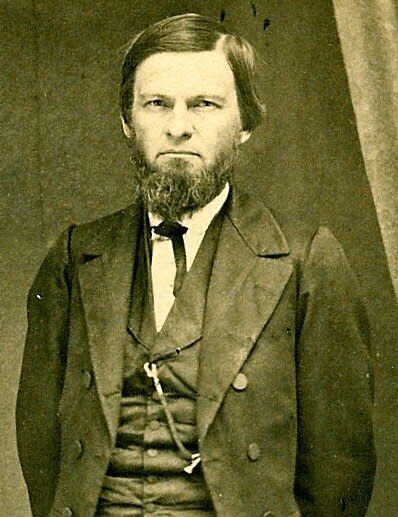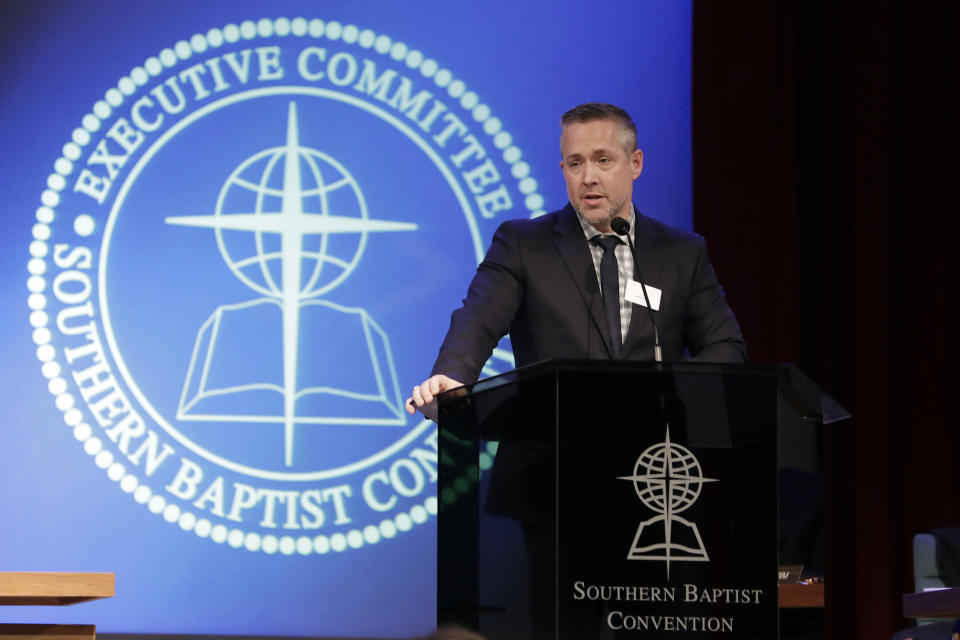Evangelical Leader Calls On Denomination To Retire Gavel Named For Slaveholder
For decades, America’s largest Protestant denomination has opened its annual meetings with a gavel named for a slaveholder.
Now, as symbols of the Confederacy are taken down across the country in the wake of George Floyd’s death, the historic gavel and its place in the Southern Baptist Convention’s traditions are being questioned.
SBC President J.D. Greear is calling for the nearly 150-year-old gavel, named after Southern Baptist leader and white supremacist John A. Broadus, to be retired.
“While we do not want to, nor could we, erase our history, it is time for this gavel to go back into the display case at the Executive Committee offices,” Greear wrote in a statement on the Baptist Press, the SBC’s official news site.
Greear’s proposal is the denomination’s latest attempt to confront its racist roots. The SBC was formed in 1845 by a breakaway group of Baptists in the South who believed it was moral for Christian missionaries to own slaves. The SBC is now a network of 47,000 autonomous, predominantly white, conservative evangelical churches.
The Broadus gavel has long held a cherished place in the SBC’s traditions and history. It was reportedly constructed with wood from Jerusalem, to symbolize Jesus’s ministry, according to the SBC’s historical records. Broadus presented it to the convention in 1872, and it has been used at most of the SBC’s annual gatherings since then.
The Broadus gavel, which every president since 1872 has taken up to call the SBC to order. #SBC16 pic.twitter.com/6TQaLtNoOC
— Barry McCarty (@barrymccarty) June 14, 2016
Greear, a North Carolina megachurch pastor who was elected SBC president in 2018, said he felt uneasy about using the Broadus gavel during last year’s annual meeting. Greear said he didn’t know that he had a choice to use other historic SBC gavels.
The Broadus gavel wouldn’t have been used this year regardless, since the SBC’s annual meeting was canceled due to the coronavirus pandemic. But next year, Greear said he’s going to consider using other options, such as the Annie Armstrong gavel, which is named after a Baptist missionary.
Retiring the Broadus gavel would send “a symbolic yet tangible message that we are a convention of all people, made in the image of God, and who matter deeply to God,” Greear wrote.
Some Black Southern Baptist pastors have criticized the denomination’s use of the Broadus gavel in the past. Days before Greear’s post, Dwight McKissic, a Black SBC pastor in Texas, wrote on Twitter that the “John Broadus gavel must go.”
A slave handing the pen to the signers of the Declaration of Independence, documented its hypocrisy, the John Broadus gavel does likewise in the SBC. The John Broadus gavel must go. It’s the spirit that gave name & heroic status to the gavel, that’s created the current divide.
— Dwight McKissic (@pastordmack) June 7, 2020
McKissic told The Washington Post on Wednesday that Greear’s announcement seemed to be a “substantive” step.
“I’m grateful to see this shifting and not excuse-making for keeping these Confederate relics and celebration of Confederate heroes,” McKissic said.
R. Albert Mohler Jr., president of the Southern Baptist Theological Seminary, compared Broadus’s place in SBC history to that of America’s Founding Fathers.
“The reality is, you can’t tell the story of the SBC without John Broadus,” Mohler, who is expected to become the denomination’s next president, told the Post. “That does not mean a president should choose his gavel in 2020 or in 2021 to tell that story.”
Broadus is revered in SBC circles as one of the founders of the Southern Baptist Theological Seminary in Louisville, Kentucky. He’s also known for being an expert in homiletics, the art of preaching.
But the denomination recently began grappling with his racism.
Historical records show that in 1860, Broadus owned at least two slaves. During an 1863 Baptist meeting, Broadus drafted and presented resolutions pledging Southern Baptist support for the Confederacy during the Civil War. He served as a chaplain for Confederate soldiers and had a standing invitation to preach for Gen. Robert E. Lee.

After the war, Broadus and other faculty at the Southern Baptist Theological Seminary defended white rule and the continued disenfranchisement of Black Americans, according to a report issued by the seminary in 2018.
By 1882, Broadus had repudiated the American system of chattel slavery, according to the report. But his white supremacist ideas persisted. He continued to advance the idea that Black people were morally and biologically inferior to white people.
In a paper Broadus wrote in 1883, he suggested that the “typical” Black person is a “barbarian” and “vastly inferior in point of intelligence.” In that same paper, he suggested slavery had actually been beneficial to some Black people.
“It is a vast and difficult task to lift up the lower races of mankind into Christian enlightenment,” Broadus wrote in 1883. He became the seminary’s president in 1889.
The seminary refused to admit Black students until 1940 and officially affirmed integration in 1951. It wasn’t until 1995 that the SBC issued a formal apology for defending slavery at its founding, failing to adequately support the civil rights movement and allowing some of its congregations to exclude African Americans from membership.
Love HuffPost? Become a founding member of HuffPost Plus today.

In 2017, the SBC came very close to blocking the passage of a resolution, championed by McKissic, to officially condemn white supremacy and the extreme right. A revised version of the resolution ultimately passed, but only after considerable internal debate and social media backlash.
In another misstep that year, faculty at a Southern Baptist seminary in Texas staged a photo mimicking stereotypes of black rappers ― posing with hoodies, chain necklaces and even a gun. The university president later apologized for the photo.
Now calls for the SBC to speak up about racial injustice are reemerging after the Minneapolis police killing of Floyd, a Black man who died May 25 while an officer knelt on his neck.
Greear’s announcement about the Broadus gavel comes just two days after he encouraged all Southern Baptists to declare that Black lives matter ― while making sure to point out that he doesn’t agree with all of the official organization’s goals.
“I think saying bold things like ‘defund the police’ is unhelpful and deeply disrespectful to many public servants who bravely put themselves in harm’s way every day to protect us,” Greear said during a video address to Southern Baptists on Tuesday. “But I know that we need to take a deep look at our police systems and structures and ask what we’re missing. Where are we missing the mark? And I’ll say that we do that because Black lives matter.”
This article originally appeared on HuffPost.


